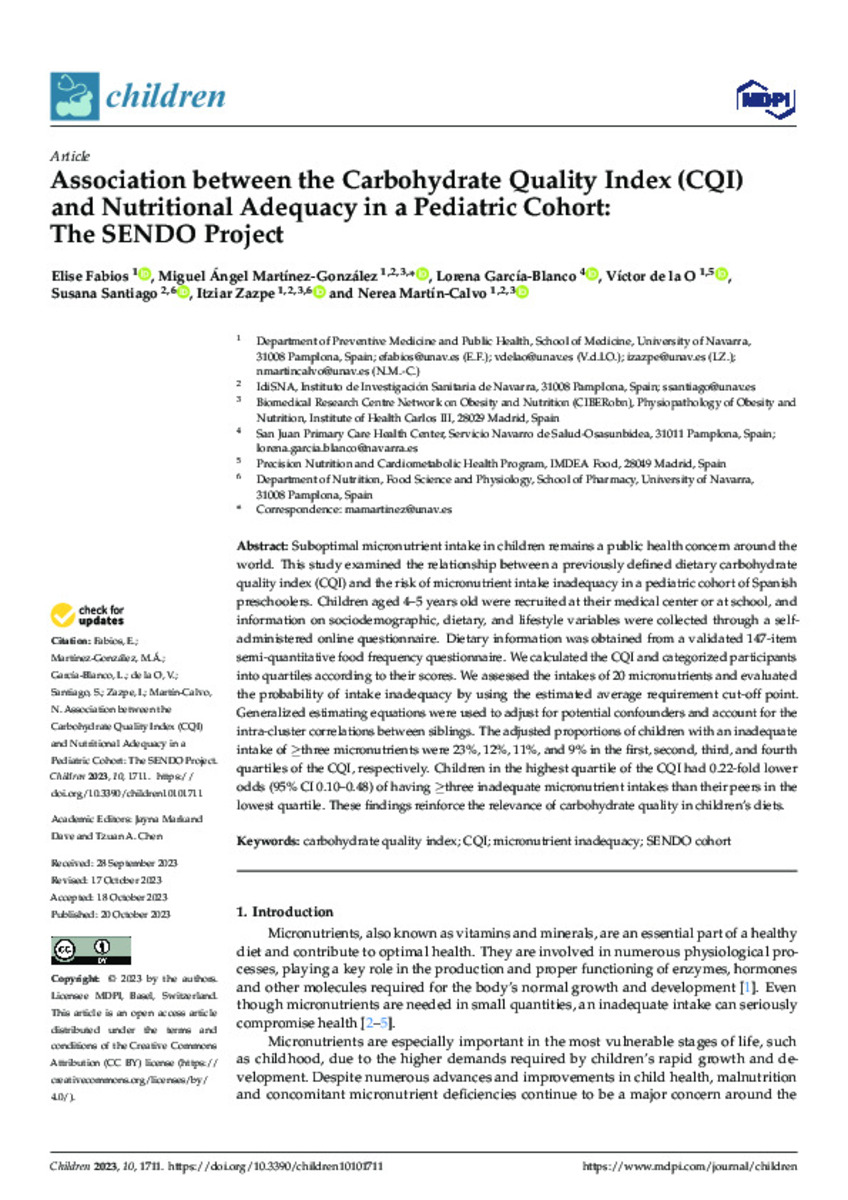Full metadata record
| DC Field | Value | Language |
|---|---|---|
| dc.creator | Fabios, E. (Elise) | - |
| dc.creator | Martinez-Gonzalez, M.A. (Miguel Ángel) | - |
| dc.creator | García-Blanco, L. (Lorena) | - |
| dc.creator | De-la-O-Pascual, V. (Víctor) | - |
| dc.creator | Santiago, S. (Susana) | - |
| dc.creator | Zazpe, I. (Itziar) | - |
| dc.creator | Martin-Calvo, N. (Nerea) | - |
| dc.date.accessioned | 2024-02-22T10:55:00Z | - |
| dc.date.available | 2024-02-22T10:55:00Z | - |
| dc.date.issued | 2023 | - |
| dc.identifier.citation | Fabios, E. (Elise); Martinez-Gonzalez, M.A. (Miguel Ángel); García-Blanco, L. (Lorena); et al. "Association between the carbohydrate quality index (CQI) and nutritional adequacy in a pediatric cohort: The SENDO project". children. 10 (10), 2023, 1711 | es_ES |
| dc.identifier.issn | 2227-9067 | - |
| dc.identifier.uri | https://hdl.handle.net/10171/69156 | - |
| dc.description.abstract | Suboptimal micronutrient intake in children remains a public health concern around the world. This study examined the relationship between a previously defined dietary carbohydrate quality index (CQI) and the risk of micronutrient intake inadequacy in a pediatric cohort of Spanish preschoolers. Children aged 4-5 years old were recruited at their medical center or at school, and information on sociodemographic, dietary, and lifestyle variables were collected through a self-administered online questionnaire. Dietary information was obtained from a validated 147-item semi-quantitative food frequency questionnaire. We calculated the CQI and categorized participants into quartiles according to their scores. We assessed the intakes of 20 micronutrients and evaluated the probability of intake inadequacy by using the estimated average requirement cut-off point. Generalized estimating equations were used to adjust for potential confounders and account for the intra-cluster correlations between siblings. The adjusted proportions of children with an inadequate intake of ≥three micronutrients were 23%, 12%, 11%, and 9% in the first, second, third, and fourth quartiles of the CQI, respectively. Children in the highest quartile of the CQI had 0.22-fold lower odds (95% CI 0.10-0.48) of having ≥three inadequate micronutrient intakes than their peers in the lowest quartile. These findings reinforce the relevance of carbohydrate quality in children's diets. | es_ES |
| dc.description.sponsorship | This research received no external funding. It was funded by internal resources of the Department of Preventive Medicine and Public Health of the University of Navarra | es_ES |
| dc.language.iso | eng | es_ES |
| dc.publisher | MDPI | es_ES |
| dc.rights | info:eu-repo/semantics/openAccess | es_ES |
| dc.subject | CQI | es_ES |
| dc.subject | SENDO cohort | es_ES |
| dc.subject | Carbohydrate quality index | es_ES |
| dc.subject | Micronutrient inadequacy | es_ES |
| dc.title | Association between the carbohydrate quality index (CQI) and nutritional adequacy in a pediatric cohort: The SENDO project | es_ES |
| dc.type | info:eu-repo/semantics/article | es_ES |
| dc.description.note | This article is an open access article distributed under the terms and conditions of the Creative Commons Attribution | es_ES |
| dc.identifier.doi | 10.3390/children10101711 | - |
| dadun.citation.number | 10 | es_ES |
| dadun.citation.publicationName | Children | es_ES |
| dadun.citation.startingPage | 1711 | es_ES |
| dadun.citation.volume | 10 | es_ES |
| dc.identifier.pmid | 37892374 | - |
Files in This Item:
Statistics and impact
Items in Dadun are protected by copyright, with all rights reserved, unless otherwise indicated.






